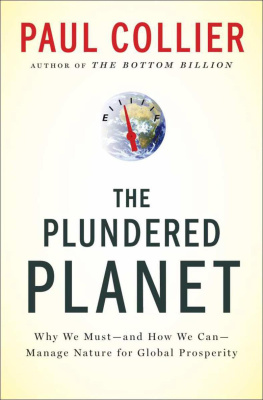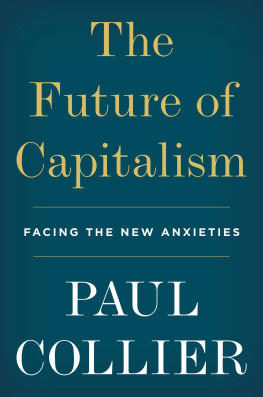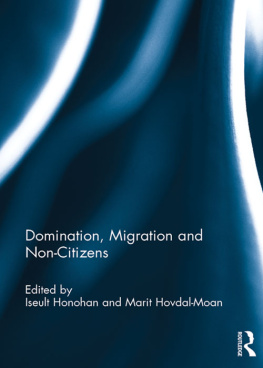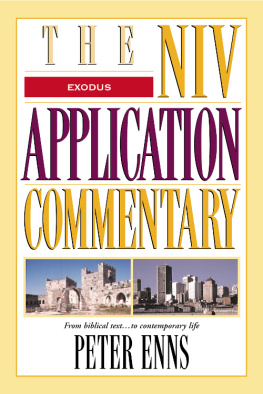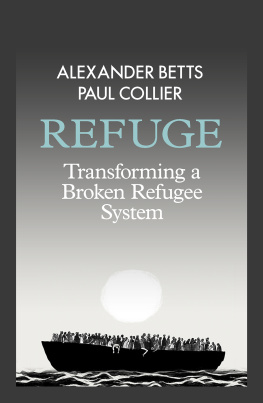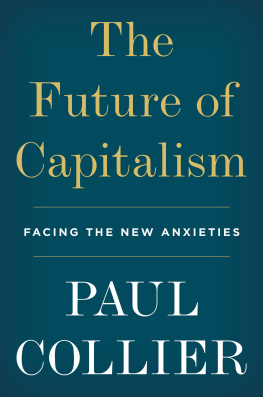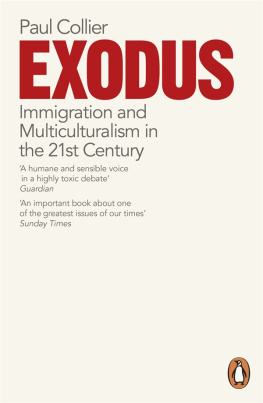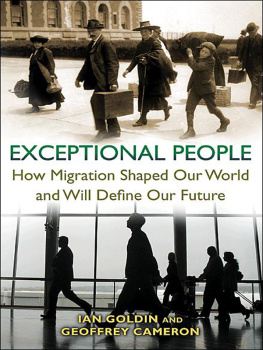EXODUS
Also by Paul Collier
The Bottom Billion: Why the Poorest Countries Are Failing and What Can Be Done about It
The Plundered Planet: Why We Mustand How We CanManage Nature for Global Prosperity
Wars, Guns, and Votes: Democracy in Dangerous Places
Exodus
How Migration Is Changing Our World
PAUL COLLIER


Oxford University Press is a department of the University of Oxford.
It furthers the Universitys objective of excellence in research,
scholarship, and education by publishing worldwide.
Oxford New York
Auckland Cape Town Dar es Salaam Hong Kong Karachi
Kuala Lumpur Madrid Melbourne Mexico City Nairobi
New Delhi Shanghai Taipei Toronto
With offices in
Argentina Austria Brazil Chile Czech Republic France Greece
Guatemala Hungary Italy Japan Poland Portugal Singapore
South Korea Switzerland Thailand Turkey Ukraine Vietnam
Oxford is a registered trade mark of Oxford University Press
in the UK and certain other countries.
Published in the United States of America by
Oxford University Press
198 Madison Avenue, New York, NY 10016
Paul Collier 2013
All rights reserved. No part of this publication may be reproduced, stored in a retrieval system, or transmitted, in any form or by any means, without the prior permission in writing of Oxford University Press, or as expressly permitted by law, by license, or under terms agreed with the appropriate reproduction rights organization. Inquiries concerning reproduction outside the scope of the above should be sent to the Rights Department, Oxford University Press, at the address above.
You must not circulate this work in any other form
and you must impose this same condition on any acquirer.
Library of Congress Cataloging-in-Publication Data
Collier, Paul.
Exodus : how migration is changing our world / Paul Collier.
p. cm.
Includes bibliographical references and index.
ISBN 978-0-19-539865-6
1. Emigration and immigrationHistory21st century.
2. MulticulturalismHistory21st century.
3. Developing countriesEmigration and immigration. I. Title.
JV6033.C65 2014
304.8dc23 2013006809
1 3 5 7 9 8 6 4 2
Printed in the United States of America
on acid-free paper
For Pauline, my rootless cosmopolitan
Contents
EXODUS
Prologue
HE FACES ME AS I WRITE THIS: KARL HELLENSCHMIDT . No longer the penniless young immigrant, by the time of the photograph he has a suit, an English wife, and six young children. He looks confidently into the camera, unaware that his family is about to be wrecked by the anti-immigrant racism of the First World War. Britain is soon fighting to defend civilization from the barbaric Huns. He is one of them. Civilization, in the guise of the gutter rag John Bull, includes Karl Hellenschmidt in its trumped-up list of enemy agents. By night a civilized mob attacks his shop. A representative of civilization tries to strangle his wife. He is interned as an enemy alien; his wife succumbs to terminal depression. Twelve-year-old Karl Hellenschmidt Jr. is pulled out of school to run the shop. And then, barely twenty years later, another war: Karl Hellenschmidt Jr. moves home and changes his name. He becomes Charles Collier.
Many of us are the descendants of immigrants. Natural sentiments of belonging can easily be tipped into the visceral cruelty of which my family was a victim. But such responses to immigrants are not universal. By chance this year I met someone whose father had been on the other side at that anti-German riot. The recognition that innocent immigrants had been wronged had descended down his family as it has down mine.
My grandfather migrated from a poverty-stricken village in Germany, Ernsbach, to what was then the most prosperous city in Europe: Bradford. That move, not just country to country but village to city, typifies modern migration from poor countries to rich ones. But once he arrived in Bradford, my grandfathers sense of youthful adventure reached its limit: he went straight to a district already so packed with other German immigrants that it was known as Little Germany. The same limits to adventure characterize todays migrants. A century on, Bradford is no longer the most prosperous city in Europe: in a reversal of fortunes it is now far less prosperous than Ernsbach. It has remained a city of arrival, and it has remained a city of tensions. Elected by immigrant votes, Britains only member of Parliament who belongs to the Respect Party, essentially a party of Islamic extremists, is from Bradford. This time, some of the immigrants really are enemy agents: four of them committed the terrorist suicide bombings that killed fifty-seven people in London. Immigrants can be perpetrators of visceral cruelty as well as its victims.
This book is in part a continuation of my work on the poorest societiesthe bottom billion. Peoples struggle to migrate from these countries to the rich West is both of professional and personal moment. It is a difficult but important question whether the resulting exodus is beneficial or harmful to those left behind. These are the poorest societies on earth, and yet the Wests policies on immigration create effects on them that are both inadvertent and unrecognized. We should at least be aware of what, in an absence of mind, we are doing to these societies. I also see my friends torn between their duty to remain home and their duty to make the most of opportunities.
But the book is also a critique of the prevailing opinion among liberal thinkers, a group of which I am a member, that modern Western societies should embrace a postnational future. In view of my own family circumstances, I might be expected to be an enthusiast for that new orthodoxy. At borders we present three different passports: I am English, Pauline is Dutch but brought up in Italy, while Daniel, born in the United States, proudly sports his American passport. My nephews are Egyptian, their mother is Irish. This book, like my previous ones, is written in France. If ever there was a postnational family, mine is surely it.
But what if everyone did that? Suppose that international migration were to become sufficiently common as to dissolve the meaning of national identity: societies really became postnational. Would this matter? I think it would matter a great deal. Lifestyles such as that of my family are dependent, and potentially parasitic, on those whose identity remains rooted, thereby providing us with the viable societies among which we choose. In the countries on which I workthe multicultural societies of Africathe adverse consequences of weak national identity are apparent. The rare great leaders such as Julius Nyerere, the first president of Tanzania, have struggled to forge a common identity among their people. But is national identity not toxic? Does it not lead back to that anti-Hun riot? Or worse: Chancellor Angela Merkel, Europes preeminent leader, has voiced fears that a revival of nationalism would risk a return not just to race riots but to war. I recognize that in espousing the value of national identity I must credibly allay these fears.
Even more than with my other books I am dependent upon an international array of other scholars. Some are my colleagues and partners in research; others I have never even met but can benefit from through their publications. Modern academic endeavor is organized into a vast array of specialists. Even within the economics of migration, researchers are highly specialized. For this book I needed the answers to three clusters of questions: What determines the decisions of migrants? How does migration affect those left behind? How does it affect indigenous populations in host countries? Each of these questions has distinct specialists. But I came increasingly to realize that migration is not primarily about economics: it is a social phenomenon, and as for academic specialism, this opens Pandoras box. Surmounting these different analyses was an ethical question: by what moral metric should the various effects be judged? Economists have a glib little ethical toolkit called utilitarianism. It works a treat for the typical task, which is why it has become standard. But for a question such as the ethics of migration it is woefully inadequate.
Next page

